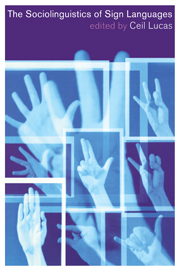Book contents
- Frontmatter
- Contents
- List of figures
- List of tables
- List of contributors
- Foreword
- Preface and acknowledgments
- List of abbreviations
- 1 Introduction
- 2 Multilingualism: The global approach to sign languages
- 3 Bilingualism and language contact
- 4 Sociolinguistic variation
- 5 Discourse analysis
- 6 Language planning and policy
- 7 Language attitudes
- Bibliography
- Index
7 - Language attitudes
Published online by Cambridge University Press: 24 November 2009
- Frontmatter
- Contents
- List of figures
- List of tables
- List of contributors
- Foreword
- Preface and acknowledgments
- List of abbreviations
- 1 Introduction
- 2 Multilingualism: The global approach to sign languages
- 3 Bilingualism and language contact
- 4 Sociolinguistic variation
- 5 Discourse analysis
- 6 Language planning and policy
- 7 Language attitudes
- Bibliography
- Index
Summary
Which reminds me that the funniest thing I saw over the whole holiday period was the Queen's Speech as interpreted into sign language by a splendid blonde lady in a long blue dress. Her hands flew like birds to convey the message to the deaf; all the relevant emotions crossed her face in a constant flux of sun and cloud. It was an Oscar winner among sign language mimes and nailed alongside her by the miracle of TV technology, the royal visage spoke and stared out in granite immobility. I hope HM and millions of the deaf enjoyed it as much as we did. But my guess is some back-room electronic wizard is making urgent inquiries about emigration.
Reference to British Sign Language in The Guardian, 2 January 1989, reprinted in Gregory and Miles (1991)The language stands for being Irish, the whole ethnic component, and it stands for one other thing. It stands for what is old-fashioned, agricultural, archaic, not entirely of this world or this time, and that doesn't help.
Reference to Irish in an interview with Joshua Fishman, 1975, reprinted in Ó Murchú (1994)We all form attitudes and opinions – sometimes positive, sometimes negative – about languages, such as British Sign Language (BSL) or Irish referred to above, and varieties of languages, such as African American Vernacular English (AAVE) or Received Pronunciation (RP). We may feel that one language or variety is “elegant”, “expressive”, and “musical”, while another is “vulgar”, “backward” and “ugly”.
- Type
- Chapter
- Information
- The Sociolinguistics of Sign Languages , pp. 181 - 216Publisher: Cambridge University PressPrint publication year: 2001
- 11
- Cited by



